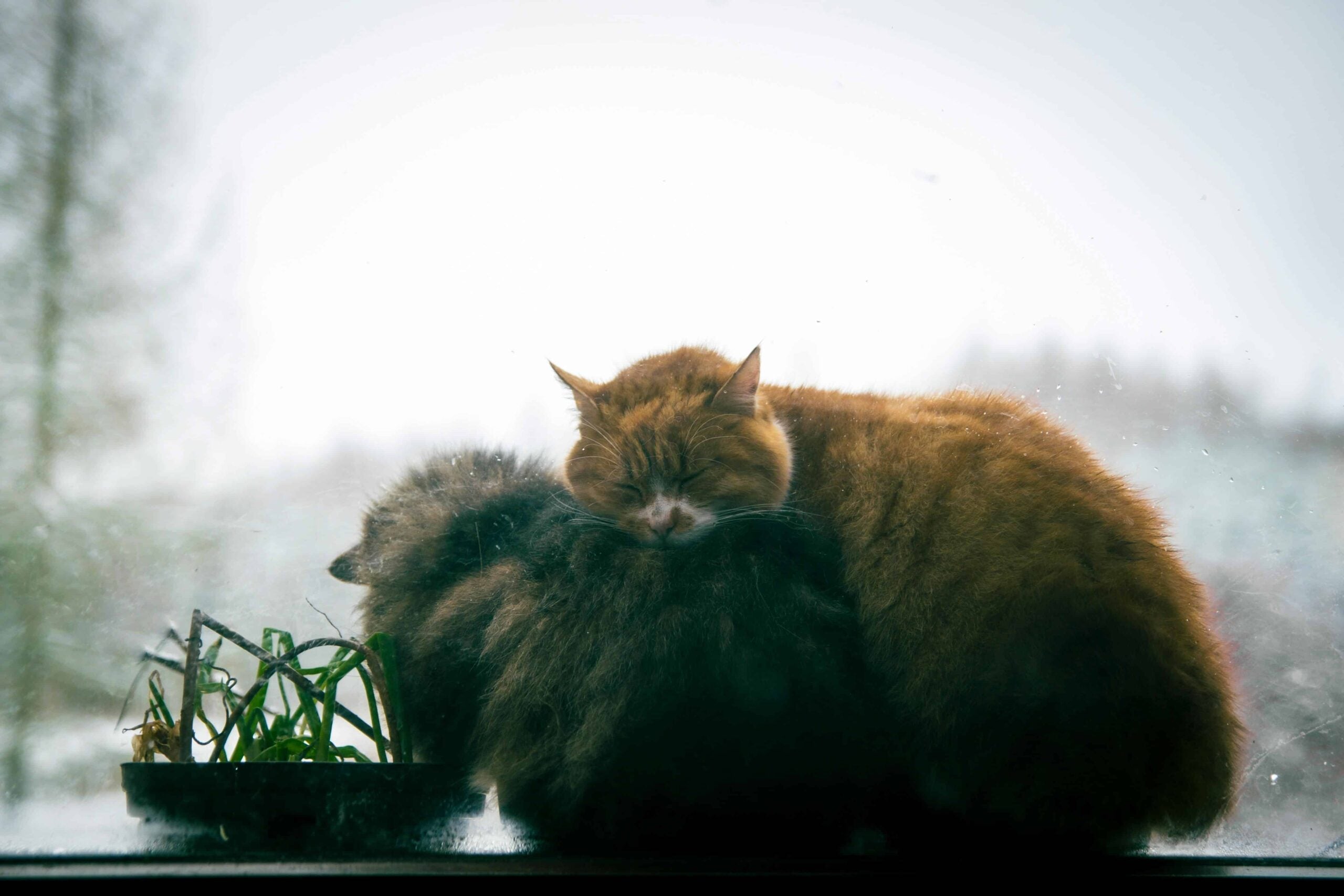
Do Your Cats Get Cold in the Winter? Here's How to Warm Them at Home
Ever wonder if your cat feels the chill when winter rolls around? Just like us, cats can get cold too. While their fur provides some warmth, it might not be enough during those freezing months. So, how can you keep your furry friend cozy and warm at home? Let's explore some simple ways to make sure your cat stays comfortable all winter long.
Key Takeaways
- Cats do feel cold, especially in winter; they can get hypothermia or frostbite if not kept warm.
- Providing warm bedding and blankets in draft-free spots can help your cat stay cozy.
- Interactive indoor games and toys can keep your cat active and warm during cold days.
- A nutritious diet supports a healthy coat, which helps insulate your cat against the cold.
- Regular vet check-ups in winter can prevent cold-related health issues.
Understanding How Cats Get Cold in the Winter
Signs Your Cat is Feeling Cold
Cats, despite their furry coats, can feel the chill just like us. If you're shivering, chances are your cat might be, too. Look for signs like shivering, seeking out warm spots, or curling up into a tight ball. These behaviors indicate they're trying to preserve body heat. Pay attention to their ears, paws, and tail—if they feel cold to the touch, your feline friend might need some extra warmth.
Why Cats Feel the Chill
Even though cats have a built-in fur coat, they aren't immune to the cold. Cats can get cold if they spend too much time in a drafty area or if the temperature drops suddenly. Short-haired or hairless breeds are particularly susceptible. Cats rely on their environment to help regulate their body temperature, so when the house gets chilly, they do too.
The Science Behind Cat Fur and Cold Weather
Cat fur, with its dual-layered coat, provides warmth in moderate cold but may not be enough in harsh winters. A cozy, warm environment is crucial for comfort and health, as prolonged exposure can lead to hypothermia or frostbite. Ensure cats have access to safe indoor spaces during colder months.
Creating a Cozy Environment for Your Feline Friend
Choosing the Right Bedding
Cats love to snuggle up in warm, comfy spots, especially during the colder months. Choosing the right bedding is key to keeping your cat happy and warm. Opt for soft, plush materials that provide insulation. Elevate your cat's bed off the cold floor to prevent drafts and keep it in a cozy corner of the house. You can also consider heated pet beds or self-warming pads that reflect your cat’s body heat, ensuring they stay toasty.
Setting Up Warm Spots Around the House
Create several warm spots around your home where your cat can relax. Cats naturally seek out warmth, so place beds or blankets in sunlit areas or near heating vents. Think about adding blankets to their favorite napping spots, like windowsills or couches. If your cat loves watching the world go by, make sure their window perch is draft-free.
Using Safe Heating Options
When it comes to keeping your cat warm, safety is paramount. Use pet-safe heating pads, which are designed to warm up to a safe temperature. Avoid electric blankets, as they can overheat or pose a risk if chewed. Be cautious with fireplaces and space heaters; always supervise your cat around these to prevent accidents. For keeping cats indoors during winter, it's advisable due to various risks outside, so ensure your home is a warm haven for them.
Indoor Activities to Keep Your Cat Warm and Active
Fun Games to Play Indoors
When the weather outside is frightening, keeping your cat entertained indoors can be delightful. Cats are natural hunters, so games that mimic hunting can be a big hit. Try using a feather wand or a laser pointer for some interactive fun. These toys can get your cat moving and help them burn off energy. You can also create a DIY obstacle course using cardboard boxes and paper bags. Cats love to explore new spaces, and these can provide hours of entertainment.
Interactive Toys for Cold Days
Interactive toys are a great way to keep your cat engaged and warm during the winter months. Puzzle feeders can stimulate your cat's brain while also rewarding them with treats. Automated toys that mimic prey can also be exciting for your feline friend. Remember to rotate toys regularly to keep things fresh and interesting.
The Benefits of Exercise in Winter
- Regular play sessions maintain cat's weight and health.
- Encourage movement during winter to reduce stress and prevent behavioral issues.
- Well-exercised cats are happier and more content.
- Regular play benefits physical and mental health, leading to a longer, healthier life.
- Comprehensive guide available for more insights on cat behavior.
Related: Feline Discomfort: How to Tell If Your Cat is in Pain
Feeding Your Cat for Winter Warmth
Nutritional Needs in Cold Weather
When the temperature drops, your cat's nutritional needs might change. Cats burn more calories trying to stay warm, so they may need a bit more food. Consider adding a little extra to their meals to keep their energy levels up. High-quality cat food rich in proteins and fats can help maintain a healthy weight and support their immune system.
Foods That Help Keep Cats Warm
Certain foods can actually help your cat stay warm. Here are some ideas:
- Protein-Rich Foods: Opt for foods with high protein content, like chicken or fish, to fuel your cat's metabolism.
- Healthy Fats: Incorporate foods with healthy fats, such as fish oil, to help keep their fur coat thick and insulating.
- Warm Meals: Serve your cat's food slightly warmed up. This not only makes it more appealing but also helps them maintain body heat.
Hydration Tips for Winter Months
Even in winter, hydration is critical. Cats might not drink as much when it's cold, so:
- Ensure they have access to fresh, unfrozen water at all times.
- Consider using a cat water fountain to encourage drinking.
- Wet cat food can also help increase their water intake, keeping them hydrated and healthy.
Safety Tips for Outdoor Cats in Winter
Building a Safe Outdoor Shelter
When the chill of winter sets in, outdoor cats need a cozy spot to retreat. Creating a warm, dry shelter is essential. Here’s how you can do it:
- Use a sturdy, waterproof box or container. Insulate it with straw or blankets to help trap body heat.
- Elevate the shelter off the ground to keep it dry and to prevent it from freezing.
- Ensure the entrance is small enough to keep out larger animals but big enough for your cat to enter easily.
Monitoring Outdoor Time
Winter days can be harsh, so it's crucial to monitor your cat's outdoor activities.
- Limit their time outside, especially during extreme cold snaps.
- Encourage your cat to come inside during the night when temperatures drop further.
- Always check garages and sheds before closing them to make sure your cat isn’t trapped inside.
Recognizing Signs of Hypothermia
Cats are resilient but not invincible. Watch for these signs that your cat might be too cold:
- Shivering or trembling
- Lethargy or weakness
- Pale or gray gums
Immediately bring your cat indoors with warm blankets and consult a vet if symptoms persist. Winter precautions include monitoring behavior, making adjustments, and ensuring their comfort and safety.
The Importance of Regular Vet Check-Ups During Winter
Winter comes with its own set of challenges for your feline friend. Regular vet check-ups are crucial to catch any potential health issues early. Cats can be prone to respiratory infections, especially if they spend time outdoors. Plus, the cold can exacerbate joint problems in older cats. Make sure your vet checks for signs of arthritis or other age-related conditions.
Preventative Care Tips
- Vaccinations: Keep your cat's vaccinations up to date to protect against common winter illnesses.
- Flea and Tick Prevention: Even in winter, fleas can find their way into your home. Discuss prevention options with your vet.
- Hydration and Nutrition: Ensure your cat is drinking enough water and getting the right nutrients. Dry winter air can lead to dehydration.
When to Seek Veterinary Advice
- Behavior Changes: If your cat is less active or eating less, it might be time for a check-up.
- Signs of Illness: Look for coughing, sneezing, or any discharge from the eyes or nose.
- Skin and Coat Issues: Winter can lead to dry skin and a dull coat. Your vet can recommend treatments or supplements.
Regular vet visits not only keep your cat healthy but also provide peace of mind. It's better to be proactive and ensure your pet is in top shape rather than dealing with unexpected health issues later.
Remember, keeping your cat healthy during the winter months involves more than just a cozy bed and a warm spot by the heater. Hydration is also key, as cats can easily become dehydrated with the dry indoor air.
Related: Watery Eyes: Exploring Reasons for Your Cat’s Tears
Common Winter Hazards for Cats and How to Avoid Them
Dangers of Antifreeze Poisoning
Antifreeze is a silent threat lurking in many garages and driveways during winter. Just a few licks can be lethal for your cat. Its sweet taste may attract them, but the chemicals can cause severe kidney damage. Ensure all containers are tightly sealed and any spills are cleaned up immediately. Consider using pet-safe antifreeze alternatives if possible.
Avoiding Frostbite and Hypothermia
Cats, especially those that love the outdoors, are at risk of frostbite and hypothermia in cold weather. Keep your cat indoors as much as possible during freezing temperatures. If they must go out, limit their time and always dry them off when they return. Providing a warm shelter outside can also help keep them safe.
Keeping Cats Away from Space Heaters
Space heaters pose a fire risk for cats, so opt for automatic shut-off models and supervise them. Winter presents unique challenges, so take simple precautions to keep your cat safe. Check your home and yard for hazards, and consider keeping your cat indoors during harsh weather. Extra care and extra care can keep your pet healthy and happy.
Wrap-Up: Keeping Your Feline Friend Cozy
To keep your cat warm during colder months, create a cozy environment with soft blankets, warm beds, and extra playtime. Ensure your cat's comfort by providing a warm nook by the window or a playful chase game. These small adjustments can make a big difference in keeping them warm and fostering a sense of warmth.
Share
